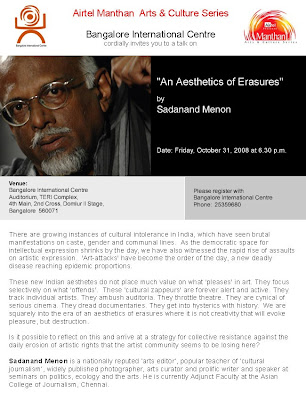Winter School in Philosophy
(December 30, 2008 – January 10, 2009)
Organized by
Department of Humanities and Social Sciences
Indian Institute of Technology Guwahati
in association with
Indian Institute of Advanced Study, Shimla
CLASSROOM INTRODUCTION TO PHILOSOPHY
Understanding the nature of Reality, Knowledge and Value
It is often felt that teaching a course in ‘Introductory Philosophy’ is far more difficult than teaching a course on a specific philosophical area at a relatively higher level. The ‘introductory’ nature of Philosophy is not elementary in nature. Indeed, there is not ‘elementary’ philosophy with which one can begin as a way of introducing the student to Philosophy. Philosophy is, by nature, intrinsically ‘deep’ right from the beginning. The pool of philosophy is deep all over, with no shallow banks. Any enduring academic experience of teaching Philosophy surely testifies to this claim.
If a teacher has to introduce Philosophy as a specific discipline in an under-graduate class, how would he or she go about doing that? Are there basic chapters of a typical text to start with, in the way there are in other disciplines like Physics and Economics and Biology? Even if certain basic chapters are touched upon, how basic are the contents of those topics or concepts? It seems that the so-called ‘basics’ of Philosophy are far too dense in meaning to help the student make a smooth and easy entry into the subject.
It is almost pointless to begin the discourse with the etymological meaning of ‘Philosophy’, e.g. ‘Love of Wisdom’. After all, the term ‘wisdom’ itself is not too clear or free from ambiguity. Besides, wisdom is not what the teacher is going to teach in a professional academic discourse of Philosophy. The teacher would therefore do well to think of a more ‘practical’ and ‘relevant’ way of accompanying the student in the journey of Philosophy.
Perhaps the best strategy is to begin with the illustration of the central samples of philosophical discussion that have traditionally been the occupation of philosophers. Here the move would require making use of the traditional classification of Philosophy into three broad categories of discourse: Metaphysics or the Theory of Reality; Epistemology or the Theory of Knowledge; Axiology or Value Theory. The introductory discourse of Philosophy ought to take up the principal concerns of these three sectors.
The two-week long
Metaphysical issues relate to the question of being, whether it is the “Being of God, the World, or the Self”. There are traditional “Arguments for the existence of God: Especially the Ontological Argument”, arguments of “Realism or Idealism about the existence of the World”, and both “Substance-essentialist and Anti-substantivist arguments regarding the existence of the Self”. Furthermore, there are subsidiary metaphysical questions concerning “Mind-Body Dualism”, “Causality, Determinism and freedom of the Will”, and about “Universals and Particulars”.
Epistemological issues that prominently figure in discussion include the “Platonic Definition of Knowledge and the Gettier Problem”, “Perceptual Knowledge”, “A Priori Knowledge”, “Internalist and Externalist theories of Epistemic Justification”, and the general “Problem of Skepticism”.
Axiological questions basically concern Ethics and Aesthetics. Some major issues include “Morality and Egoism/Altruism”, “Moral relativism/Absolutism”, Moral Theories like “Eudaimonism, Utilitarianism and Deontology”, “Virtue Ethics”, and the rise of “Applied Ethics”. Aesthetic problems related to questions about the “Ontology of Art”, “Aesthetic Detachment”, theories of “Artistic Representation/Expression/Form”, and the “Value of Art in Human Culture”.
The
Emphasis will be laid on thematic discussion and understanding of Philosophy rather than a historical understanding. Reference to history of philosophy would be subservient to thematic relevance. The Indian/Western division of Philosophy would be circumvented by an attempt to tackle a given problem from different angles.
It is most important to realize that the young mind of the student is quite likely to be puzzled by the kind of questions that arise in Philosophy. That is because of the unique peculiarity of the discourse. The teacher must therefore be able to explain why at all such peculiar problems arise, and how they inevitably arise given human rational inquisitiveness. The
It is expected that the two weeks of rigorous philosophical training and interactive exercise of reflection will create enough confidence in the mind of the young teacher/scholar of Philosophy. Towards the final stage of the School, some particular sessions will be exclusively devoted to the demonstration of teaching by the participants. This exercise will be accompanied by regular written assignments on relevant issues.
It is hoped that the result of this exercise in the Winter School will eventually be a rough working paper that synoptically describes a fairly standard programme of ‘A Classroom Introduction to philosophy’. The urgency of such an outcome cannot be denied at least for one reason. Philosophy is certainly unlike other academic discourses because of its peculiar nature. The ‘justification’ of Philosophy is often demanded in view of its apparently ‘impractical’ and abstract character. A young philosopher therefore must be well-versed in the arguments that lend justification to the philosophical enterprise. And the ‘arguments for justification’ must be amenable to their grasp at the introductory level.
It is known that the patterns of courses/papers taught in different Universities are not always the same, and not all Universities have Semester-system method of teaching. But the
On the whole, the
The
Participants are allowed to claim II tier air-conditioned return fare by rail for their journey from the place of work to Guwahati and back, plus charges of local transportation by taxi/auto/bus etc. Free accommodation will be provided to the participants on a twin-sharing basis in the Guest House of IIT Guwahati. Local hospitality will be free all along. For detail write to:
Dr. Archana Barua/Dr.V.Prabhu,
Course Coordinator: Winter School in Philosophy,
Department of Humanities and Social Sciences,
Indian Institute of Technology Guwahati,
Guwahati – 781039.
E.mail: vprabhu@iitg.ernet.in



